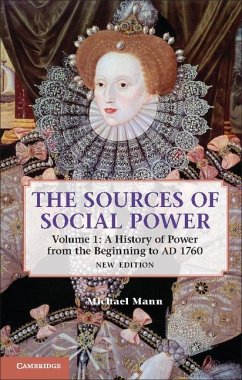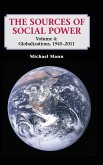Michael Mann
The Sources of Social Power
Michael Mann
The Sources of Social Power
- Gebundenes Buch
- Merkliste
- Auf die Merkliste
- Bewerten Bewerten
- Teilen
- Produkt teilen
- Produkterinnerung
- Produkterinnerung
Volume 1 examines interrelations between sources of power from neolithic times up to just before the Industrial Revolution in England.
Andere Kunden interessierten sich auch für
![The Sources of Social Power The Sources of Social Power]() Michael MannThe Sources of Social Power110,99 €
Michael MannThe Sources of Social Power110,99 €![The Sources of Social Power The Sources of Social Power]() Michael MannThe Sources of Social Power108,99 €
Michael MannThe Sources of Social Power108,99 €![A Researcher's Guide to Sources on Soviet Social History in the 1930s A Researcher's Guide to Sources on Soviet Social History in the 1930s]() Sheila FitzpatrickA Researcher's Guide to Sources on Soviet Social History in the 1930s196,99 €
Sheila FitzpatrickA Researcher's Guide to Sources on Soviet Social History in the 1930s196,99 €![Social Welfare And The Liquor Problem Social Welfare And The Liquor Problem]() Harry Sheldon WarnerSocial Welfare And The Liquor Problem34,99 €
Harry Sheldon WarnerSocial Welfare And The Liquor Problem34,99 €![Incidents in the Life of a Slave Girl Incidents in the Life of a Slave Girl]() Harriet JacobsIncidents in the Life of a Slave Girl10,99 €
Harriet JacobsIncidents in the Life of a Slave Girl10,99 €![The Sources of Impact in College on Gay Male Student Identity The Sources of Impact in College on Gay Male Student Identity]() Christopher EatonThe Sources of Impact in College on Gay Male Student Identity46,99 €
Christopher EatonThe Sources of Impact in College on Gay Male Student Identity46,99 €![Interpretation of French words: sources of conflict in the North of the PNVi? Interpretation of French words: sources of conflict in the North of the PNVi?]() Josias Kambale LuhembaInterpretation of French words: sources of conflict in the North of the PNVi?19,99 €
Josias Kambale LuhembaInterpretation of French words: sources of conflict in the North of the PNVi?19,99 €-
-
-
Volume 1 examines interrelations between sources of power from neolithic times up to just before the Industrial Revolution in England.
Hinweis: Dieser Artikel kann nur an eine deutsche Lieferadresse ausgeliefert werden.
Hinweis: Dieser Artikel kann nur an eine deutsche Lieferadresse ausgeliefert werden.
Produktdetails
- Produktdetails
- Verlag: Cambridge University Press
- Seitenzahl: 578
- Erscheinungstermin: 8. November 2012
- Englisch
- Abmessung: 235mm x 157mm x 35mm
- Gewicht: 977g
- ISBN-13: 9781107031173
- ISBN-10: 1107031176
- Artikelnr.: 37455073
- Herstellerkennzeichnung
- Libri GmbH
- Europaallee 1
- 36244 Bad Hersfeld
- gpsr@libri.de
- Verlag: Cambridge University Press
- Seitenzahl: 578
- Erscheinungstermin: 8. November 2012
- Englisch
- Abmessung: 235mm x 157mm x 35mm
- Gewicht: 977g
- ISBN-13: 9781107031173
- ISBN-10: 1107031176
- Artikelnr.: 37455073
- Herstellerkennzeichnung
- Libri GmbH
- Europaallee 1
- 36244 Bad Hersfeld
- gpsr@libri.de
Michael Mann is Distinguished Professor of Sociology at the University of California, Los Angeles. He is the author of Power in the 21st Century: Conversations with John Hall (2011), Incoherent Empire (2003) and Fascists (Cambridge University Press, 2004). His book The Dark Side of Democracy (Cambridge University Press, 2004) was awarded the Barrington Moore Award of the American Sociological Association for the best book in comparative and historical sociology in 2006.
Preface to the second edition
1. Societies as organized power networks
2. The end of general social evolution: how prehistoric peoples evaded power
3. The emergence of stratification, states and multi-power-actor civilisation in Mesopotamia
4. A comparative analysis of the emergence of stratification, states and multi-power-actor civilisations
5. The first empires of domination: the dialectics of compulsory cooperation
6. 'Indo-Europeans' and iron: expanding, diversified power networks
7. Phoenicians and Greeks: decentralized multi-power-actor civilisations
8. Revitalized empires of domination: Assyria and Persia
9. The Roman territorial empire
10. Ideology transcendent: the Christian ecumene
11. A comparative excursus into the world religions: Confucianism, Islam, and (especially) Hindu caste
12. The European dynamic: I. the intensive phase, AD 800-1155
13. The European dynamics: II. the rise of coordinating states, 1155-1477
14. The European dynamic: III. international capitalism and organic national states, 1477-1760
15. European conclusions: explaining European dynamism - capitalism, Christendom, and states
16. Patterns of world-historical development in agrarian societies
Index.
1. Societies as organized power networks
2. The end of general social evolution: how prehistoric peoples evaded power
3. The emergence of stratification, states and multi-power-actor civilisation in Mesopotamia
4. A comparative analysis of the emergence of stratification, states and multi-power-actor civilisations
5. The first empires of domination: the dialectics of compulsory cooperation
6. 'Indo-Europeans' and iron: expanding, diversified power networks
7. Phoenicians and Greeks: decentralized multi-power-actor civilisations
8. Revitalized empires of domination: Assyria and Persia
9. The Roman territorial empire
10. Ideology transcendent: the Christian ecumene
11. A comparative excursus into the world religions: Confucianism, Islam, and (especially) Hindu caste
12. The European dynamic: I. the intensive phase, AD 800-1155
13. The European dynamics: II. the rise of coordinating states, 1155-1477
14. The European dynamic: III. international capitalism and organic national states, 1477-1760
15. European conclusions: explaining European dynamism - capitalism, Christendom, and states
16. Patterns of world-historical development in agrarian societies
Index.
Preface to the second edition
1. Societies as organized power networks
2. The end of general social evolution: how prehistoric peoples evaded power
3. The emergence of stratification, states and multi-power-actor civilisation in Mesopotamia
4. A comparative analysis of the emergence of stratification, states and multi-power-actor civilisations
5. The first empires of domination: the dialectics of compulsory cooperation
6. 'Indo-Europeans' and iron: expanding, diversified power networks
7. Phoenicians and Greeks: decentralized multi-power-actor civilisations
8. Revitalized empires of domination: Assyria and Persia
9. The Roman territorial empire
10. Ideology transcendent: the Christian ecumene
11. A comparative excursus into the world religions: Confucianism, Islam, and (especially) Hindu caste
12. The European dynamic: I. the intensive phase, AD 800-1155
13. The European dynamics: II. the rise of coordinating states, 1155-1477
14. The European dynamic: III. international capitalism and organic national states, 1477-1760
15. European conclusions: explaining European dynamism - capitalism, Christendom, and states
16. Patterns of world-historical development in agrarian societies
Index.
1. Societies as organized power networks
2. The end of general social evolution: how prehistoric peoples evaded power
3. The emergence of stratification, states and multi-power-actor civilisation in Mesopotamia
4. A comparative analysis of the emergence of stratification, states and multi-power-actor civilisations
5. The first empires of domination: the dialectics of compulsory cooperation
6. 'Indo-Europeans' and iron: expanding, diversified power networks
7. Phoenicians and Greeks: decentralized multi-power-actor civilisations
8. Revitalized empires of domination: Assyria and Persia
9. The Roman territorial empire
10. Ideology transcendent: the Christian ecumene
11. A comparative excursus into the world religions: Confucianism, Islam, and (especially) Hindu caste
12. The European dynamic: I. the intensive phase, AD 800-1155
13. The European dynamics: II. the rise of coordinating states, 1155-1477
14. The European dynamic: III. international capitalism and organic national states, 1477-1760
15. European conclusions: explaining European dynamism - capitalism, Christendom, and states
16. Patterns of world-historical development in agrarian societies
Index.








